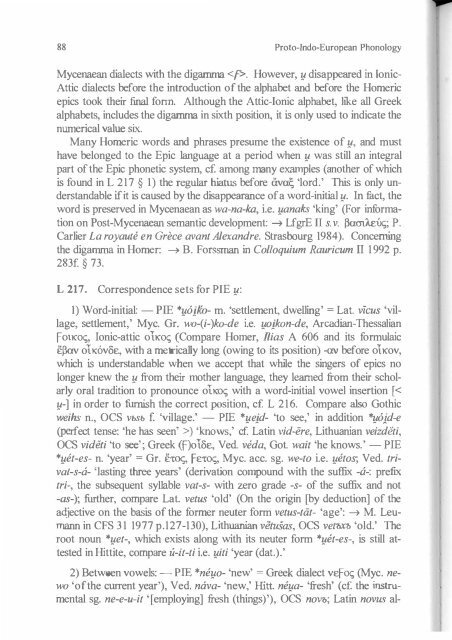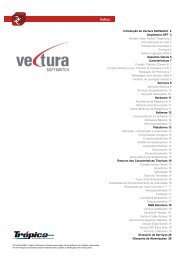Create successful ePaper yourself
Turn your PDF publications into a flip-book with our unique Google optimized e-Paper software.
88 Prot(}-Ind(}-European PhonologyMycenaean dialects with the digamma . However, !! disappeared in lonicAttic dialects before the introduction <strong>of</strong> the alphabet and before the Homericepics took their final fonn. Although the Attic-Ionic alphabet, like all Greekalphabets, includes the digamma in sixth position, it is only used to indicate thenumerical value six.Many Homeric words and phrases presume the existence <strong>of</strong> !!, and musthave belonged to the Epic language at a period when !! was still an integralpart <strong>of</strong> the Epic phonetic system, cf. among many examples (another <strong>of</strong> whichis found in L 217 § I) the regular hiatus before av 'lord.' This is only understandableif it is caused by the disappearance <strong>of</strong> a word-initial !!. In fiIct, theword is preserved in Mycenaean as wa-na-ka, i.e. !!anaks 'king' (For informationon Post-Mycenaean semantic development: -7 LfgrE IT s. v. IlamA.e{x;; P.Carlier La royaute en Grece avant Alexandre. Strasbourg 1984). Concerningthe digamma in Homer: -7 B. Forssman in Colloquium Rauricum IT 1992 p.283f § 73.L 217. Correspondence sets for PIE !!:I) Word-initial: - PIE *!!ojlto- m. 'settlement, dwelling' = Lat. vicus 'village,settlement,' Myc. Gr. wo-(i-)ka-de i.e. !!ojkan-de, Arcadian-ThessalianFOtK, Ionic-attic OtK (Compare Homer, Rias A 606 and its formulaicejlav ohov&:, with a metrically long (owing to its position) -ay before OtKov,which is understandable when we accept that while the singers <strong>of</strong> epics nolonger knew the !! from their mother language, they learned from their scholarlyoral tradition to pronounce oh with a word-initial vowel insertion [*dos and >*d?viB.C.c)3"12"" *d. os > de. us but clivicent. B.c.Commentary: In individual cases, the phonetic situations descrihed in § 2have led to the disintegration <strong>of</strong> paradigms. Thus, deus 'god/divinity' vs.clivus 'as a divinity, worshiped.' (Several <strong>of</strong> the forms featured on the tableare not attested; although they are marked with *, their assertion is noncontroversial.)The 'a' level shows a uniform Old Latin paradigm <strong>of</strong> theroot dej7Jo- 'divinity' < 'heavenly.' (For more information on this word, cfW 202 § 2.) On level 'b' is shown the monophthongization <strong>of</strong> ej > e, cf. L220 § 1. A divergent development is shown in level 'c': disappearance <strong>of</strong> !!when followed by olu (on *d.os > de. us cp. Leumann LLFL 1977 p. 10Sf.),retention when followed by elila. From the last stage (c) <strong>of</strong> development beganthe formation <strong>of</strong> two new paradigms: On the one hand, deus with thenew genitive sg. dei 'god'; on the other hand, clivi with the new nom. sg.clivus 'as a divinity, worshiped.' - Compare equally the ClassICal Latmwords oleum 'olive ai!' vs. oliva 'olive, olive tree': The initial forms are*elaj!!om (from which, in a first step, the phenomenon <strong>of</strong> vowel weakening<strong>of</strong> middle syllables yields *olei7Jom, and in a second -e!!Om > -e. om >-eum) and *elaj!!ii (from which comes first *olej!!ii, then *-!!a > -ilia).4) Postconsonantal !! is also fur the most part preserved. However, severalphonetic rules <strong>of</strong> Latin have obscured iroportant correspondence sets. Com-





